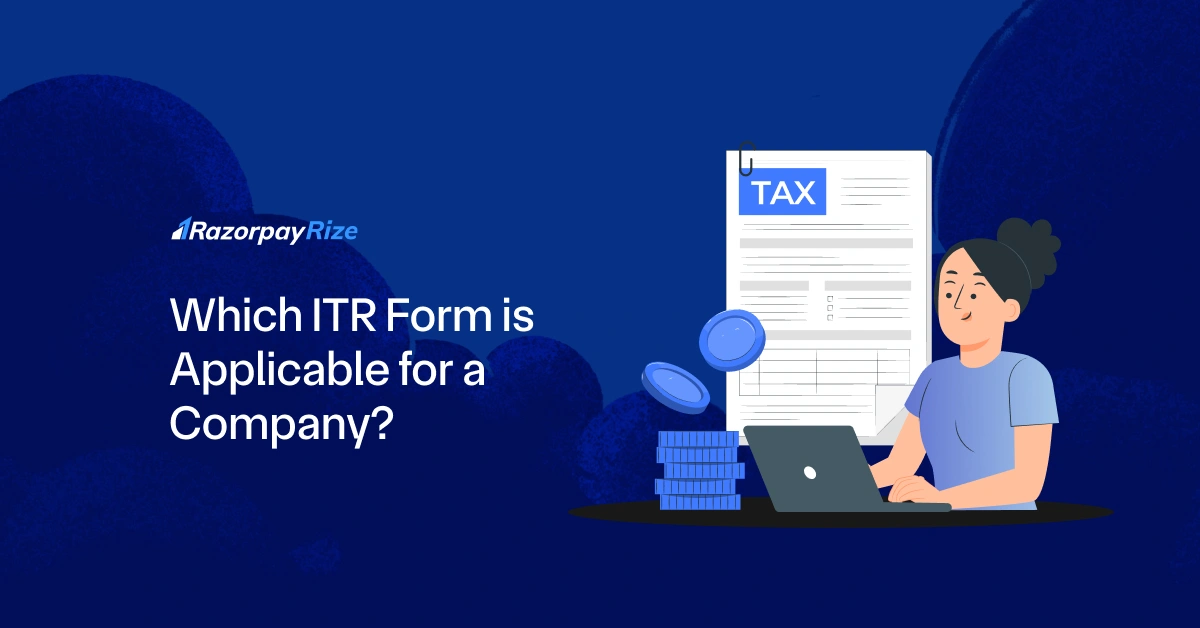Filing an Income Tax Return (ITR) is mandatory for all companies in India, regardless of profit or business activity. Even if your company is dormant, you must comply with tax regulations. The applicable ITR form depends on factors such as income source, earnings, and business structure. Most companies file ITR-6, while ITR-5 is used for LLP companies and partnership firms. If you own a company, choosing the right ITR is essential to ensure compliance and avoid penalties. Proper company tax return filing helps meet legal obligations efficiently.
Table of Contents
Income Tax Return
An Income Tax Return is a document submitted to the Income Tax Department to report your income, deductions, and tax payments for a financial year. There are seven types of ITR forms, including ITR-1, ITR-2, ITR-3, ITR-4, ITR-5, and ITR-6, each applicable to different taxpayers. Filing ITR before the due date is essential to avoid penalties and legal issues.
Applicable ITR Forms for Companies
The type of ITR for a company depends on its structure and income classification. Different business entities must file specific ITR forms to comply with tax regulations:
- ITR-4: Suitable for firms (excluding LLPs) with income up to ₹50 lakhs under Sections 44AD, 44ADA, and 44AE.
- ITR-5: Applicable for LLPs and partnership firms, except those required to file ITR-7.
- ITR-6: Used by companies that do not claim tax exemptions under Section 11 (income from property used for charitable or religious purposes).
- ITR-7: Mandatory for entities filing under Sections 139(4A), 139(4B), 139(4C), and 139(4D), such as trusts and political parties.
ITR-4 Form (Sugam) – For Firms Other Than LLPs
ITR-4 is designed for individuals, Hindu Undivided Families (HUFs), and partnership firms (excluding Limited Liability Partnerships) that opt for the presumptive taxation scheme under Sections 44AD, 44ADA, and 44AE. This scheme simplifies tax calculations for small businesses and professionals.
Applicability Criteria:
- Eligible Taxpayers: Individuals, HUFs, and firms (excluding Limited Liability Partnership) with business or professional income.
- Residency Requirement: Only applicable to a resident other than not ordinarily resident.
- Income Sources:
- Business income under Section 44AD (small businesses).
- Professional income under Section 44ADA (specified professions).
- Income from goods transportation under Section 44AE.
- Business income under Section 44AD (small businesses).
In certain cases, if your business meets specific conditions, you may also need to submit Form 3CA/3CB and Form 3CD for a tax audit.
ITR-5 – For LLPs and Partnerships
ITR-5 is an income tax return form applicable to Limited Liability Partnerships, partnership firms, and other non-individual entities such as Associations of Persons (AOPs), Bodies of Individuals (BOIs), artificial juridical persons, and investment funds.
These entities must file ITR-5 to report their income, deductions, and tax liabilities to the Income Tax Department. Filing this form ensures compliance with tax laws and helps avoid penalties. However, companies required to file ITR-7 cannot use ITR-5 for tax filing.
ITR-6 – For Companies That Are Not Claiming Exemption Under Section 11
ITR-6 is an income tax return form for companies that are not claiming exemptions under Section 11, which applies to income from property held for charitable or religious purposes.
- It is mandatory for private limited companies, public limited companies, and One Person Companies (OPCs).
- Not applicable to Limited Liability Partnerships, as they must file ITR-5.
Filing ITR-6 accurately is compulsory for all companies that do not qualify for exemptions under Section 11. Timely filing is essential to avoid penalties and ensure compliance.
ITR-7 – For Companies
ITR-7 is an income tax return form for companies, firms, trusts, and other entities required to file returns under Sections 139(4A), 139(4B), 139(4C), and 139(4D) of the Income Tax Act, 1961. It applies to organisations that do not qualify for other ITR categories but must still comply with tax regulations.
Entities Required to File ITR-7:
- Registered charitable or religious trusts
- Societies and other institutions for charitable purposes
- Educational institutions and universities
- Scientific research associations
- News agencies
- Political parties registered under Section 29A of the Representation of the People Act, 1951
- Bodies set up for religious or charitable purposes
Filing ITR-7 is essential for these entities to comply with tax laws, report income, and claim applicable exemptions.
Details Required in an ITR Form
The information required in an Income Tax Return form depends on the type of taxpayer and income sources. However, certain key details must be included in all ITR filings.
- Personal Information: Name, PAN, date of birth, contact details, and residential address and other personal details.
- Income Sources: Details of salary, business or profession, capital gains, rental income, interest, and other earnings.
- Deductions & Exemptions: Deductions and exemptions include the tax benefits you claim under different sections of the Income Tax Act, 1961.
- Tax Payments: Information on the taxes you have already paid, such as advance tax, self-assessment tax, and Tax Deducted at Source (TDS).
- Foreign Assets & Income: If applicable, disclosure of overseas bank accounts, investments, and earnings.
Filing an ITR with correct details ensures timely processing and avoids unnecessary scrutiny from tax authorities.
Important Deadlines for Filing Company ITR
Due Dates for Filing ITR-6
- If audit is required under the Income Tax Act – 31st October of the assessment year.
- If a report in Form No. 3CEB (for international transactions) is required – 30th November of the assessment year.
- If audit is not required – 31st July of the assessment year.
Due Dates for Filing ITR-7
- For entities not requiring an audit – 31st July of the assessment year.
- For entities requiring an audit – 30th September of the assessment year.
It is important to note that ITR filing deadlines may change based on updates or extensions announced by the Income Tax Department. You should stay informed about official notifications to avoid missing any revised due dates.
As per Section 234F, a late filing fee of ₹5,000 is applicable if the return is filed after the due date under Section 139(1). However, if the total income is ₹5 lakh or less, the penalty is reduced to ₹1,000.
Common Mistakes to Avoid While Filing Company ITR
Incorrect Form Selection
Selecting the wrong ITR form is one of the most frequent mistakes companies make. The type of ITR form a company must file depends on its structure and nature of operations. ITR-5 is applicable for LLP and partnership firms, whereas ITR-6 is meant for most companies except those claiming exemptions under Section 11. ITR-7 is required for entities like trusts and NGOs. Filing the incorrect form can lead to rejection or discrepancies in tax assessment.
Incomplete Financial Disclosures
A company is required to disclose all sources of income, deductions, and financial transactions in its ITR. Failing to provide complete details of revenue, expenses, capital gains, investments, liabilities, and foreign assets can result in tax penalties or audits. Accurate disclosure ensures that tax authorities have a clear understanding of the company’s financial position.
Missing Audit Report Submission
Companies that meet specific turnover or income thresholds are required to undergo a tax audit as per the Income Tax Act. If a tax audit is applicable, the company must submit the audit report before filing the ITR. Missing this step can lead to legal consequences, penalties, or delays in return processing. It is important to verify whether the company falls under the audit requirement and ensure timely submission of audit reports.
Frequently Asked Questions
Private Limited Company
(Pvt. Ltd.)
- Service-based businesses
- Businesses looking to issue shares
- Businesses seeking investment through equity-based funding
Limited Liability Partnership
(LLP)
- Professional services
- Firms seeking any capital contribution from Partners
- Firms sharing resources with limited liability
One Person Company
(OPC)
- Freelancers, Small-scale businesses
- Businesses looking for minimal compliance
- Businesses looking for single-ownership
Private Limited Company
(Pvt. Ltd.)
- Service-based businesses
- Businesses looking to issue shares
- Businesses seeking investment through equity-based funding
One Person Company
(OPC)
- Freelancers, Small-scale businesses
- Businesses looking for minimal compliance
- Businesses looking for single-ownership
Private Limited Company
(Pvt. Ltd.)
- Service-based businesses
- Businesses looking to issue shares
- Businesses seeking investment through equity-based funding
Limited Liability Partnership
(LLP)
- Professional services
- Firms seeking any capital contribution from Partners
- Firms sharing resources with limited liability
Frequently Asked Questions
Can a company file ITR-7?
No, a company cannot file ITR-7. This form is applicable only to entities such as trusts, political parties, religious institutions, and charitable organisations that are required to file returns under Sections 139(4A), 139(4B), 139(4C), or 139(4D) of the Income Tax Act.
Can a company file ITR-4?
No, ITR-4 filing is not meant for companies. It is designed for individuals, Hindu Undivided Families, and partnership firms (excluding limited liability partnership) that opt for the presumptive taxation scheme under Sections 44AD, 44ADA, or 44AE. Companies must file either ITR-5 or ITR-6, depending on their structure.
Is ITR-3 for business income?
Yes, ITR-3 is for individuals and HUFs earning income from a proprietorship business or profession that does not fall under presumptive taxation. It also applies to those with investments in unlisted shares or income as a partner in a firm.
Who should file ITR-1 and ITR-2?
- ITR-1 (Sahaj): This form is for resident individuals with total income up to ₹50 lakh from salary, pension, one house property, and other income (like interest). However, if you have business income, you cannot file ITR-1.
- ITR-2: This form is for individuals and HUFs who do not have income from business or profession but may have income from capital gains, multiple house properties, foreign assets, or high earnings.







.webp)








